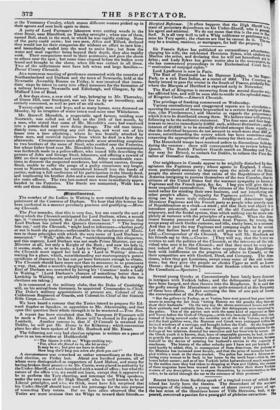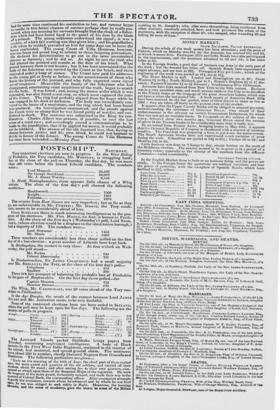Recent letters from Sardinia speak of a tragical event of
which that island has lately been the theatre. The descendant of the ancient sovereigns of the island, a young man of about twenty years of age, the last scion of the illustlious house of Villa Hermosa, had, It ap- peared, conceived a passion fora young girl of plebeian extraction. lie li-ad for some time continued his assiduities to her, and rumour began to ascribe to him better chances of success perhaps than lie really pos. ,es ed when one morning his servants brought him the cloak of a fisher- -- 5 h had been found fixed in the panel of his door by the blade man w .1c f a poinard. .The. young nobleman understood the signal ; it was a to.fadetra, of which fair warning was thus given him ; and his grandfather, with whoni he resided, prevailed on him for some days not to leave the house unattended. The young Count of Villa Hermosa, however, was too brave and proud long. to submit to these fatiguing precautions. He declared his determination to go out in the same unrestrained Manner as formerly; and he did so. At night he met the rival who bad planted the poniard and mantle at the door of his hotel. What passed between them is not known ; but it has been ascertained that the body of the fisherman was carried by the Count to the beach, and there concealed under a heap of stones. The Count now paid his addresses to the young girl as freely as. before, to the astonishment of those who knew the history of the poniard, and who fully expected some signal act of vengeance. Meanwhile the family of the fisherman who had disappeared, entertaining some suspicions of the truth, began to search for the body. It was found ; and, among the stones under which it was concealed, was also found a seal-ring, on which were engraved the arms of the Count. The ring had probably slipped from his finger while he was engaged in his deed of darkness. The body was immediately con- veyed to the house ofa magistrate, and the ring which had been found w as produced. An investigation commenced, and the proofs against the Count were so strong that he was found guilty of murder, and con- demned to death. The sentence was submitted to the King for con- firmation. Charles Albert was anxious, if possible, to save the last scion of a royal race; and accordingly caused a communication to be made to the grandfather, that if he applied for mercy, it would probably not be withheld.The answer of the old Spaniard was, that, having to choose between justice and his own blood, be could not hesitate to deciae in favour of the former. The young he de Villa Hermosa has since been beheaded.—Morning Post.



























 Previous page
Previous page